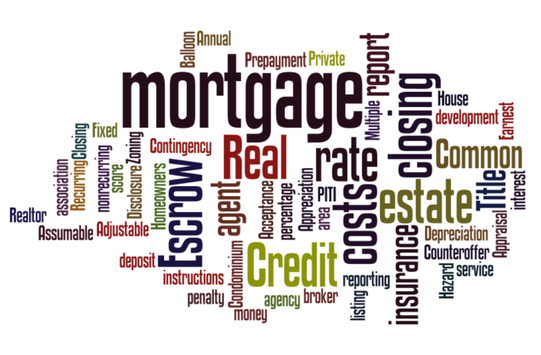The top real estate Terms and definitions that every property investor should know in 202027/6/2020 To someone starting in the real estate investment sector, the terms associated with it can sound like jargon. They might seem like an unlikely combination of letters to people not used to such investing terms. Starting out in the real estate sector is extremely intimidating, and it can be even more difficult if you don’t understand the complex-sounding terminology that people throw around. However, do not worry, because terminologies and acronyms are not too complicated, and can be understood with ease. Therefore, to help real-estate beginners and property investors out, here’s a look at some of the top real estate terms and definitions you need to be aware of. Terms Used in the Decision Process
Terms Used While Negotiating A Deal
Terms Used in the Purchase Process
 Other general Real Estate terms we should know
Property or real estate investment might be capital intensive, but when done right, it can do wonders for your financial position. The first step towards making the right investment decisions is to understand the market. Using this guide, you will be able to understand the key metrics and terms related to real estate investing. Being able to navigate the market with confidence, will help you make the right decisions and score big. We at PropertyAngel can help you along the way with any query or doubt that you may have. In case you need any help with anything related to real estate in India, reach out to us at PropertyAngel. Authored by: Dhivya Naresh
2 Comments
The past few months had seen the rapid and aggressive spread of the novel coronavirus around the world. The global pandemic has forced people into their homes and away from their businesses. More than half the world's population comes under travel bans, curfews, and restrictions. Most companies have had to shut their doors and ask employees to work from home. In the US alone, over 6.6 million people have filed for unemployment within a week. During such times, most companies are trying to cut their costs, and one way to do that is by renegotiating the lease on your company's commercial space. Here's a look at how the current situation has forced people to negotiate the rental contracts for their commercial and retail spaces. Why Renegotiate Your Lease The COVID-19 pandemic isn't the only reason you should renegotiate your lease. Knowing how to do so is an essential skill that will benefit you quite a bit. The last few years have witnessed an economic recession of sorts, and several industries have fallen prey to it. During such difficult times, being able to cut your costs is the best way to save your business. Re-evaluating your rental agreement is also required when you renew your lease, if the market undergoes changes or if your business is struggling. One common question that everyone has is, "Why should my landlord let me stay for less money?" Remember that such difficult times affect everyone. Therefore, it isn't just you, but also your landlord and family too, who are worried as a result of this issue. Therefore, ensuring they have a loyal and good tenant for longer periods is in their best interest. In the end, getting less money for more extended periods at least ensures financial security. What Renegotiation Options Do You Have?
Rent reduction In case your lease agreement is about to expire, you can try to ask for negotiation for cheaper monthly rent. This is especially true if you know you can get that price somewhere else due to changes in the market. In case you are battling financial struggles, you could also ask for a temporary rent reduction as a means to help you through the crisis. Rent abatement In case the pandemic or some other reason has hit your business very badly, you could ask for a rent abatement. In this case, you tell your landlords that you will not be paying rent for a specified period. However, after this stretch, you will pay the full amount, and sometimes even a small interest. If you expect your business to pick up soon enough, you could also ask for partial rent abatement, wherein you pay only 50% of the full rent. Sublease Subleasing your commercial space means you open up your building for some other company to set up shop. This is an excellent option if you do not occupy the space for a few months or have some extra space you are not utilizing efficiently. Most landlords are okay with this as long as the new tenants are okay with the terms of the rental agreement. Revenue Sharing In some cases, retailers who do not want to pay a very high rent can choose instead to opt for paying a percentage of their revenues as rent. This model is extremely popular in the US, and in Europe, as it helps in easing the pressure on the retailers. It helps in minimizing risk, as there is no flat lease rate or monthly rental payment. In some ways, it makes the developer themselves a retailer as they have a share of the revenue generated by the retailer. Landlords can ask for a percentage of sales, a stake in the company, or a combination of rent and sales as their payment. Other changes you can request include;
How to Renegotiate a Rental Contract for a Commercial Space
Tips on How to Renegotiate Your Commercial Lease
In a perfect world, everyone would understand someone else's position without having to say anything. However, since that is not the case, we all need to negotiate when hard times befall us. But that isn't always a bad thing as it might prove to be what helps us out the most. At the end of the day, we are all humans. People understand that national and global economic situations change at unprecedented speeds. Everything from economic slowdowns to personal crises can affect a tenants' fortunes. However, you can get out of such tight spots by being smart, doing your research, and renegotiating your lease. Authored by: Dhivya Naresh The novel coronavirus wasn’t something that any of us saw coming. However, it has had a profound impact on almost all spheres of our lives. Nearly half the world’s population now has some travel ban and curfew, restricting their movement and activities. This, coupled with unrest around the world, the threat of war and natural disasters is setting the wheels in motion for significant shifts in power. The US is now witnessing a large civil rights movement in the form of #BlackLivesMatter. Similarly, the Gulf and UAE, Europe as a whole, and Southeast Asian countries are reeling under the global pandemic. All of these are countries favoured by NRIs. However, the recent turn of events has made them rethink where they want to settle down finally. This, along with the falling rupee valuation and better RERA laws, allows NRIs to invest in Indian real estate. So, how will this impact our country, and what does this mean for NRIs? Here’s a look at everything you need to know about the impact of COVID-19 on the Indian real-estate sector. Rupee Takes A Hit In recent months, the rupee has been witnessing a fall against the dollar due to various reasons. This has helped non-resident Indians scout for properties in their homeland to settle down, and use as an investment. The past few years had been quite sedentary for the residential real estate market in India. However, all of that will soon change due to NRIs from around the world, considering India as a haven for themselves. Lack of transparency, fear of corruption, and safety issues were holding NRIs back in the past when it came to Indian real-estate. Studies show that those trends are now changing. RERA Improves Credibility The enactment and implementation of the RERA have helped the real-estate industry better its reputation. The RERA ushered in a new era of transparency, credibility, assurance, and consolidation. All of these have helped the market look more lucrative to NRIs from around the world. The weakening of the rupee has turned India into a substantial market for overseas real-estate investments. Studies show that over 30 % of NRIs want to invest in properties, and that percentage is increasing year-on-year. Why NRIs Should Consider Real-Estate as an Investment
The COVID-19 Impact The COVID-19 has led to the disruption of life in almost every country in the world. It has also led to the rupee falling and the rise in the form of the Indian real estate market. Due to the COVID-19, NRIs are coming into the Indian Real Estate scene due to its emergence as a risk-averse investment option. This global pandemic has renewed interest in residential properties in Bangalore, Hyderabad, Pune, Noida, and Gurugram. Furthermore, due to the chance for good capital appreciation, NRIs are also buying commercial spaces now. The COVID-19 has also allowed NRIs to negotiate good deals and even land ready-to-move-in propositions. If that wasn’t enough, banks are low handing out home loans for as low as 7.15% interest rates. Real-estate experts also believe that the COVID-inspired lockdown has led to the rise in the popularity of technology-driven home buying in India. Virtual real-estate sites are now successfully doing virtual tours, closing deals, and negotiating terms like never before. This added with the fact that most States are trying to bring in e-registration of property documents will make it possible for NRIs to buy their dream homes at least hassle. Why PropertyAngel However, while buying homes has become easier than ever before, maintaining them is of the utmost importance. NRIs tend to face difficulty in the maintenance and upkeep of their property, as they live far away. However, the presence and collaboration with good Property Management Companies will change all that. Clients will no longer have to worry about issues like;
People who have large real-estate portfolios find it challenging to manage all those properties when they live so far away. That is where PropertyAngel comes into the picture. These companies leverage their knowledge of the industry and local areas to maintain and manage your property to ensure you get the highest returns. It is difficult to handle all the compliances, paperwork, legal issues, and tenant search when NRIs come home for a month in a year. Therefore, PropertyAngel takes that burden off NRIs by doing it most efficiently and effectively. These PropertyAngel professionals will take care of the property, resolve tenant issues, and supervise the property. This ensures that your property investment remains secure and generates the required income for you. Constant supervision also eliminates the risk of encroachment and illegal occupancy, both of which are serious threats now. So, join hands with us to bypass the cumbersome task of managing your property and ensure you receive the return on investment you always needed! We simplify the tiresome process of managing your property to focus on the more important things in life. Authored by: Dhivya Naresh  From the very start, the year 2020 has brought with it one of the most challenging issues the world has faced in recent years. For the past few months, the world has been facing numerous adverse effects of the coronavirus pandemic, which has had a devastating effect on the Indian economy as well. India has been under a nationwide lockdown since March 25th, 2020. Now, as India moves to its fifth stage of the lockdown, the number of people infected by the virus continues to rise at a rate higher than ever before. As of June 4th 2020, there are over 220,000 COVID-19 cases and over 6300 death in India (World O Meters). The regular lives of the majority of Indians have been completely disrupted. The population demographic of the country that has the most significant influence on these changing trends are the millennials and youngsters. This population includes students and young working professionals. They not only comprise one of the most prominent sections of the population, but they are also the trendsetters of the nation. They influence the way we eat, shop, commute, and live. Most of these people leave their homes and go to cities for their work or education. This trend had given a rise to the “Co-living” industry, which largely comprise of dedicated apartment communities for single professionals, with are fully serviced with housekeeping, social infrastructure and is largely a hospitality solution. However the covid-19 pandemic has created havoc in this space, and many of these communities are now empty. Here are a few key factors that are contributing to this:
Industry experts believe that once these young professionals start returning to their work cities, they will not return to these PG buildings and co-living communities, and instead will move to more organized apartment complexes, with independent units which they can share with their own friends and family, such as those offered by PropertyAngel, Nestaway and other such property management providers. In the times of such crisis, flexibility is the key. PropertyAngel offers the perfect solution for people who want to live in clean, safe and well-maintained homes with their friends and colleagues. We believe that post the coronavirus crisis, a new trend will emerge in the real estate market, and we are here to make it easier for you to transition into this trend smoothly. |
Archives
July 2024
Categories |





 RSS Feed
RSS Feed